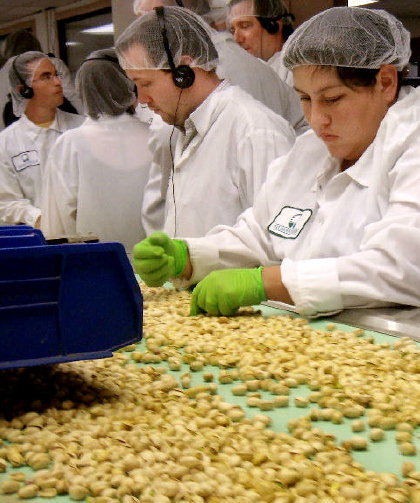As part of our search for decent seafood in Florida, Amy snapped this reminder of what is probably the most thorough food warning we’ve ever seen on a restaurant menu.
No idea whether people read these things.

As part of our search for decent seafood in Florida, Amy snapped this reminder of what is probably the most thorough food warning we’ve ever seen on a restaurant menu.
No idea whether people read these things.
Every time the U.S. Food and Drug Administration issues a public advisory about some food product, the armchair critics pounce.
 This time it’s pistachios. On March 30, FDA issued a blanket warning for folks not to eat pistachios or products containing pistachios until further details emerged. The nut industry went … nuts. Perishable Pundit Jim Prevor did his bit about how regulators and others could be sure the contamination went back to the pistachio plant. Several journalists asked me about the economic burden of such a recall, especially since there were no confirmed illnesses. I told CBS Radio that if industry wanted an economically prudent plan, industry should keep Salmonella out of pistachios.
This time it’s pistachios. On March 30, FDA issued a blanket warning for folks not to eat pistachios or products containing pistachios until further details emerged. The nut industry went … nuts. Perishable Pundit Jim Prevor did his bit about how regulators and others could be sure the contamination went back to the pistachio plant. Several journalists asked me about the economic burden of such a recall, especially since there were no confirmed illnesses. I told CBS Radio that if industry wanted an economically prudent plan, industry should keep Salmonella out of pistachios.
The other aspect is that, given the public and government scrutiny of FDA, there is probably something going on – something is not quite right at the farm or processing plant or wherever – for FDA to issue a blanket warning. FDA just doesn’t have all the details yet.
Here are some details:
Elizabeth Weise of USA Today is reporting this morning that Setton Pistachio, the company that recalled 2 million pounds of pistachios on Monday, had been receiving positive salmonella tests for as long as five months.
 David Acheson, FDA associate commissioner, said,
David Acheson, FDA associate commissioner, said,
"The question is, ‘Did Setton Farms have an ongoing problem, and what did they do about it?’ "
The FDA believes batches of pistachios that tested positive for salmonella were destroyed, not distributed. Setton Pistachio spokeswoman Fabia D’Arienzo could not confirm that.
Almond Princess Linda Harris, an expert on salmonella in nuts at the University of California-Davis, said,
"If I’m getting a positive (result) and a couple of months later another positive, and then another, I would think the appropriate response would be to say, ‘This is not right. I’ve got to figure this out.’ "
Kraft spokeswoman Susan Davison said Kraft sent an internal food-safety auditing team to Setton Farms’ Terra Bella plant on March 23 and,
"They saw the potential for cross-contamination" between raw and processed pistachios. “For example, often in companies different colored gloves are used for the raw area and the roasted area." However at the Setton plant, the same colored gloves were used in both areas.
I don’t like fresh tomatoes. .jpg) Generally, my careful avoidance of them is a fairly unique practice. At least, I thought so until I met Bret. We stand together in our quest for vegetables that don’t leak acid on the rest of the salad.
Generally, my careful avoidance of them is a fairly unique practice. At least, I thought so until I met Bret. We stand together in our quest for vegetables that don’t leak acid on the rest of the salad.
We were on our honeymoon when the outbreak of Salmonella Saintpaul in tomatoes and/or hot peppers hit the news. Many people joined our stance on tomatoes then… but it took me a while to realize it.
Since I wasn’t reading FSnet while we were gone, I had to hear the warnings put out on eating tomatoes like a regular consumer would. It was like my superhero senses were turned off.
At the time, I wasn’t in the habit of watching the news. And according to the results of a Rutgers Food Policy Institute (FPI) survey,
“The majority of respondents (66 percent) first heard about the advisory on television.”
 Throughout our trip, we ate at cafes, buffets, and casual dining establishments. When we didn’t eat out, we stopped at Wal-Mart for cereal and sandwich supplies. None of those places showed signs of produce being recalled.
Throughout our trip, we ate at cafes, buffets, and casual dining establishments. When we didn’t eat out, we stopped at Wal-Mart for cereal and sandwich supplies. None of those places showed signs of produce being recalled.
The survey found,
“A small minority (8 percent) first heard about it from restaurants and retailers.”
As it happened, some of the first news I received came from my step-dad’s mom, who understood the problem to be in tomatoes sold with the vine still attached. 
Hearing through the tomato-vine was problematic, though. I later learned the CDC advised,
“…persons with increased risk of severe infections…should not eat raw Roma or red round tomatoes other than those sold attached to the vine or grown at home…”
Those two words, “other than”, were missed (or misunderstood) at some point in the chain of communication that ended with me.
Lead author of the Rutgers FPI report, Dr. Cara Cuite said in a press release,
“Our results suggest that consumers may have a hard time taking in many details about these types of food-borne problems.”
Almost half (48 percent) of people surveyed indicated they were not sure which types of tomatoes were under suspicion.
 I was back at superhero headquarters (i.e. in front of my Mac) when Salmonella Saintpaul was found in a sample of jalapenos from Mexico, and again when the outbreak strain was isolated from a Mexican serrano pepper and the water used to irrigate it.
I was back at superhero headquarters (i.e. in front of my Mac) when Salmonella Saintpaul was found in a sample of jalapenos from Mexico, and again when the outbreak strain was isolated from a Mexican serrano pepper and the water used to irrigate it.
Most consumers weren’t so lucky. From the survey,
“The researchers found that while almost all respondents (93 percent) were aware that tomatoes were believed to [be] the source of the illness, only 68 percent were aware…that peppers were also associated with the outbreak.”
Dr. Cara Cuite commented in the press release,
“This research is especially timely in light of the growing number of recalls as a result of the Salmonella outbreak associated with peanut butter and peanut paste.”
How can consumers be better informed? One practice seen in both outbreaks that helped alleviate some confusion was the use of club membership or “loyalty card” information to contact customers who had recently bought recalled products.
What else can be done to clear things up? After all, regular consumers don’t have superhero senses.
In the spirit of open and transparent communications, the Canadian Food Inspection Agency has created a new food safety advisory panel – and not bothered to tell anybody, particularly the taxpayers that fund CFIA.
 Amidst some stories about new listeria testing protocols for Canada, the Toronto Star and CBC noted there was, “a newly formed CFIA panel of experts advising the agency on food safety.”
Amidst some stories about new listeria testing protocols for Canada, the Toronto Star and CBC noted there was, “a newly formed CFIA panel of experts advising the agency on food safety.”
So 11 years after being created, CFIA decided to get a panel of experts to advise on food safety, which, the agency declares, is it’s top priority.
There is no mention of this new science advisory panel on CFIA’s website.
.jpg)